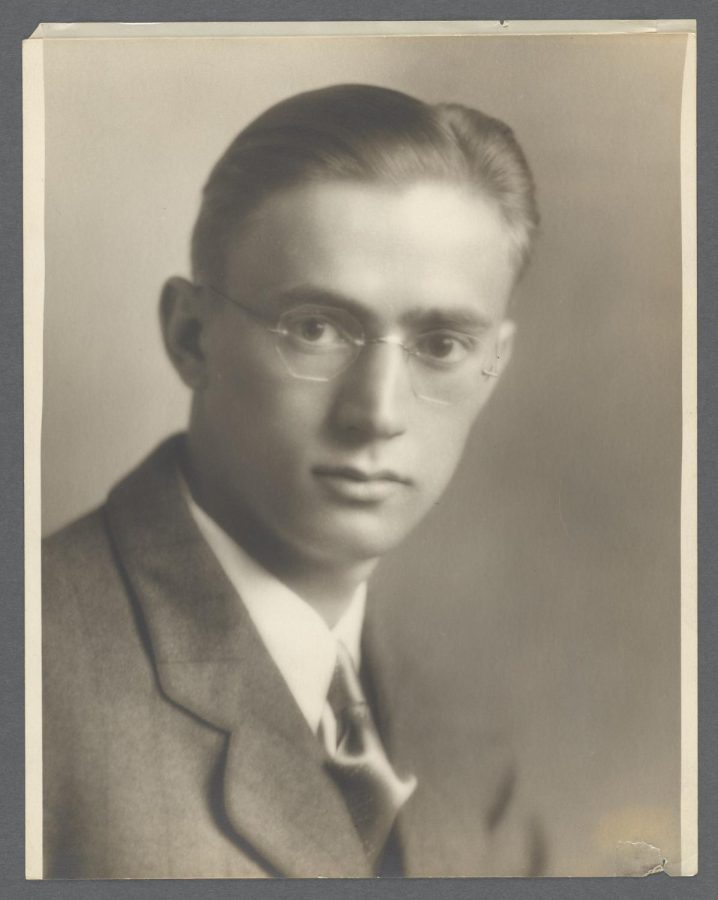Illini Media celebrates Chicagoan writer and his legacy
Nelson Algren, author of the novel “The Man with the Golden Arm,” was apart of the Illini Media staff, and found his passion of writing novels after unsuccessful attempts in finding newspaper jobs in Chicago.
Apr 5, 2022
Best known for his book “The Man with the Golden Arm,” Nelson Algren navigated an unconventional path through life as a writer. He never backed away from writing about the lower-class parts of Chicago and society that were often overlooked and ignored. In fact, his work illuminates deep-rooted issues in societal structures persisting today.
Algren has also been inducted into the Illini Media Hall of Fame Class of 2022 which celebrates not only his contributions to Illini Media but also his unique and impactful career.
Growing up in a working-class family in Chicago, Algren faced a lack of support from his parents regarding his desire to attend college. However, his sister encouraged him to pursue college, where he majored in journalism.
Algren graduated in the middle of the Great Depression in 1931, spending months trying to find a job at different papers in Chicago before traveling and hitchhiking around the Midwest.
After being jobless and homeless for months, he headed home and started to write letters on the lie of the American Dream and the emptiness of America.
Get The Daily Illini in your inbox!
“When he gets back to Chicago, he ends up turning one of those letters into his first short story,” said Colin Asher, writer of “Never a Lovely So Real,” a biography of Nelson Algren’s life. “That sets him on his path to be a writer … that story turns into his first book contract.”
What made Algren unique was his ability to blend his observations of the invisible within society with a poetic nature not usually associated with journalistic writing. There was also consistency with the messages he conveyed in his work as he started to achieve more fame.
“The focus of his work was exposing America for what it was in his eyes, and he saw us as a morally corrupt society,” Asher said.
Algren unveiled the world of the hidden, the individuals that defined Chicago’s true self and, ultimately, society’s underbelly.
“He felt that … he had to bear witness, that it was the job of the writer to reveal the lives that were to most of us invisible … that the writer could and should,” said author Russell Banks, a friend of Nelson Algren. “That was something he was relentless about.”
Another reason behind the impact of Algren’s writing was his simultaneous embodiment of the identities of the famous and the outsider.
“He identified with himself as an outsider partly because he stayed … in Chicago,” Banks said. “He stayed connected to the people he loved, the street people, the criminals, the down and out, the prostitutes, the poor, the castoffs. He stayed close to his sources.”
Published in 1949, “The Man with the Golden Arm,” a fictional story about the struggles of World War II veteran turned illicit card dealer, became one of Algren’s most well-known books, winning the National Book Award the following year. Soon after, Algren wrote “Chicago: City on the Make,” a book that spoke directly to the Red Scare and revealed previously unknown truths about Chicago.
Algren’s fame declined during the Red Scare when society was very suspicious of anyone connected to communism. The FBI even suspected Algren of being a communist, which affected his mental health. When “A Walk on the Wild Side” debuted in 1956, readers criticized Algren for the same things they enjoyed in his previous work.
Near the end of his writing life, he lived in a rented house on Long Island. During this time, he was voted a member of the American Academy of Arts and Letters, a pinnacle of the art and writing establishment in New York and the country.
“He pretended never to care, but he really cared, and he was very excited about it … so he decided he was going to have a big party,” Banks said.
However, Algren had a heart attack the night before he was supposed to be inducted into the American Academy of Arts.
“The party never came off. He never got inducted. It seemed like such a kind of sad yet awfully fitting end in a way … a story that he himself would have written,” Banks said.
Algren left behind a legacy that, although obscured in some respects, speaks to the idea and importance of a social conscience.
“His legacy is to tell other artists and writers that you can write about these things and that art should represent all parts of society,” said Michael Caplan, director of the feature-length documentary “Algren.”
Banks emphasized how the younger generation of writers can contribute to the sustenance of his legacy and the important ideas and work associated with that legacy.
“Younger writers can bring him back and … reimagine what literature can do and rediscover the fact that there is a real tradition in American realism that has a social conscience,” Banks said.






